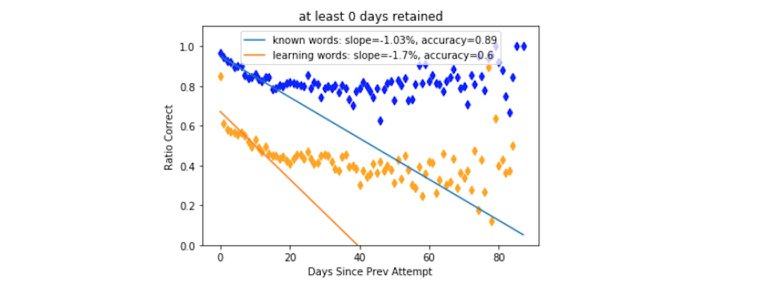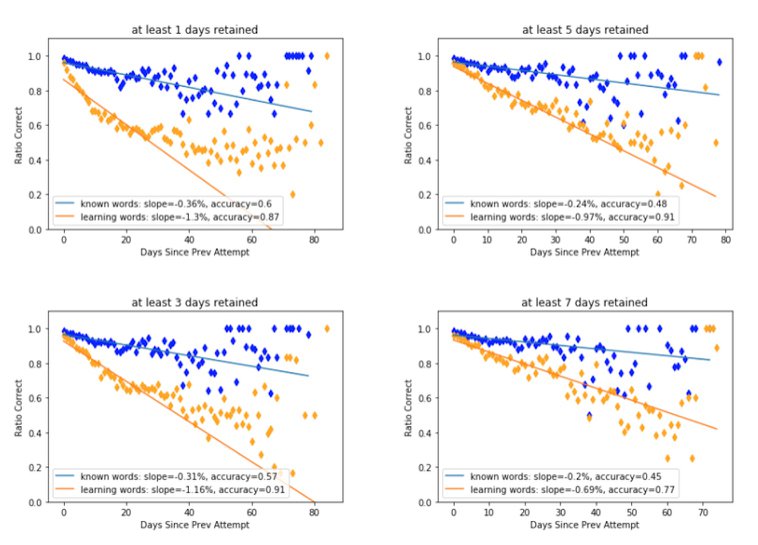Learn 1,000 Words in 15 Hours
Our vocabulary feature is designed to help people learn thousands of new vocabulary words as quickly as possible. We conducted a study to understand how long it takes to learn new vocabulary. We defined "learned" as retained for at least a full week, which in turn gives a high likelihood of retaining it a full month later. In our research, we looked at 15 million questions over a period of six months, and we found that a user typically learns a word after 51 seconds of study, or about 9 question attempts. At this rate, a person will learn 1,000 new words in just under 15 hours of study.
How Did We Get This Number?
Learning a language requires that people understand thousands of words, and our goal is to make that easier. So we set out to build the fastest way to learn vocabulary.
In this article, we share the results of a study we conducted over the past 6 months analyzing more than 15 million questions from real users learning real vocabulary words. We defined "learning" a word as retaining it for a full week, which our users have demonstrated leads to a 70% chance of getting it right 30 days later. With this definition, we found that the average user learns a new word after seeing it roughly 9 times, totaling 51 seconds of study over multiple quizzes.
Our core vocabulary lists are 1,000 words long. At 51 seconds per word, assuming every word on the list is new, this takes 14.2 hours of study, which we rounded up to 15 (to allow for bathroom breaks :P).
Ready to start your vocab journey? Let's go!
Our Data
For this analysis, we started by looking at data from about 15 million questions. We chose not to include data from multiple choice questions in this analysis, since they tend to take much less time (we'd rather err on the high side of our estimate, so you may learn even faster) and have less long-term impact on learning. This gave us about 3 million user-word-translation sets (for example, Sara is learning that "pastel" means "cake"). We'll call these UWTs moving forward.
We also knew that there would be plenty of words a user already knew. We wanted to make sure we were studying learning, so we split out any words a user got right the first time they ever saw them. This left us with about 1.7 million UWT sets being learned and 1.3 million "previously known" UWT sets.
Finally, for each question, we calculated the time since the user had last studied it, and the maximum time they'd ever proven they could remember it (more on why these are useful in a bit).
What Does it Mean "to Learn?"
To make this claim, we first had to define what we meant by "learning." We know that cramming does not lead to long term knowledge retention, so memorizing 20 household objects' names in the hour before your 5th period quiz doesn't mean you'll know them a week later. Learning has to do with retention, and the ability to remember facts over a period of time.
But how much time? We knew we wanted to find a timeframe that not only showed a user had remembered a word for a non-negligible period of time, but also that they were likely to continue remembering it into the future. We used data to identify this point.
First, we plotted our "forgetting curve." We grouped every question in each set ("known" and "learning") by how many days ago that user had studied that translation, and then plotted that against the ratio of correct answers after that many days. We then fit a linear regression (essentially, a best-fit line) to the first two weeks of data, before it leveled off, to see how quickly users were forgetting words. As suspected, users predictably forgot words over time, and were less likely to get them correct. Also as predicted, this happened more quickly for "learning" words (about 1.7% decline per day) than for more solidly "known" ones (about 1.0% decline per day).

Then, we split these charts out by how long a user had ever retained them. For example, if Sara was able to correctly translate "cake" into "pastel" on Tuesday afternoon and Wednesday evening, this UWT set would go into the "at least 1 day" group (and everything lower, like the "at least 6 hours" group) for all future attempts. If she then got it right the following Tuesday, she'd go into the "at least 7 days" and all lower groups.
What we found was that, intuitively, the longer a user had retained a word, the less quickly that retention dropped off. With only a single day minimum retention, users were 1.3% less likely per day they waited to study to get the question correct, with the steepest drop-off in the shorter term. By three days, this was down to about 1.2%, and after five days this was less than 1%. Once a user had retained it for a week, their forgetting rate was only 0.7%, having cut that initial decay in half! It had also closed the gap on a long term "known" word from 4X as steep to only 1.5X. Real learning was happening!

Additionally, we wanted to find a time where not only had the user already showed meaningful retention, but that this was likely to continue. We wanted better than a 50/50 shot for this threshold, so we looked at where, after a month, a user had a "passing chance" (around 70%) of recalling the word. This slope occurs in our data after users have retained a word for a week.
So, we defined learning a word as the point where a user has retained the word for a full week, and therefore is about 70% likely to get it correct a month later.
Turning That Into "X Words in Y Hours"
Our final step in this analysis was to understand how much study time it took to get to that crucial 7 day retention. This was fairly simple. For every UWT set, we looked at the first time a user proved they could remember it for a full day. Then we added up the active time from all their previous attempts. We define "active time" as time spent on the question. We capped this at 60 seconds per question, based on analyses showing that anything over that was likely an outlier.
We found that, of the over 55,000 UWT sets that qualified as "learned," users had studied words for an average of 77 seconds before they were able to achieve this. This data was skewed towards the lower end, so it would actually be better to use median value (the value where exactly half the data is lower and half the data is higher), which was only 51 seconds.
Doing some math, this works out to our benchmark. If you can learn a word in 51 seconds, that's 88 words an hour. That gets you 1,000 words in just under 15 hours of study, or 1,700 words in 24 hours!
So Let's Get Learning!
Now that you understand what we're proposing, the power is in your hands. Of course, we don't recommend cramming, so we hope that you'll space out your study and enjoy our quizzes enough to keep coming back. We've provided a few core lists with a ton of the best vocab to get you started. Each has 1,000 words, which works out to just under 15 hours of study. If you commit to just 30 minutes a day, you can get through your first round of words in about a month, even leaving time for you to reinforce words you struggled with at first! And spaced repetition will help you keep practicing from there, so you can remember these words for a lifetime.
Excited to get going now? ¡Vámonos!
Looking for more articles about learning Spanish? Check these articles out!














